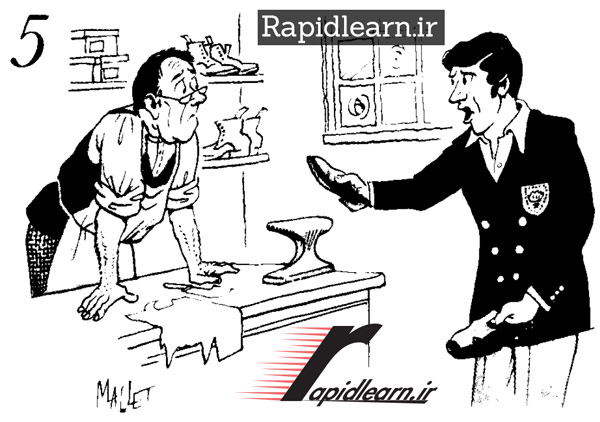|
شغل |
معادل فارسی |
شغل |
معادل فارسی |
|
actor |
هنرپیشه مرد |
actress |
هنر پیشه زن |
|
artist |
هنرمند |
captain |
ناخدا |
|
assistant |
معاون |
demarche |
بخشدار |
|
banker |
بانکدار |
dressmaker |
خیاط زنانه |
armchair
صندلی دسته دار
An armchair is a chair with arms

وان (حمام)
You take a bath in a bathtub

تختخواب
People sleep in beds

نیمکت
A few people can sit on a bench
پس از معرفی کلی آزمون آیلتس و بررسی انواع این آزمون و ویژگی های آن در چندین پست (که در آینده هم ادامه خواهد داشت) لغات ضروری را آموزش دادیم. در این پست قسمت جدید را که مربوط به اصطلاحات و افعال مرکب رایج در آیتلس می باشد شروع می کنیم. دانستن اصطلاحات آزمون آیلتس که رایج هستند می تواند به داوطلبین این آزمون کمک شایانی نماید.
زمان آینده
زمان آینده ساده ( The simple future Tense )
این زمان دلالت بر انجام کاری میکند که در آینده انجام خواهد شد و بیشتر قول و تصمیم را نشان می دهد.
چگونگی ساخت این زمان در زبان انگلیسی :این زمان را با اضافه کردن افعال کمکی( shall – will ) به جملات زمان حال ساده به دست می آید . مثل :
I (shall) will go. You will go. ( she – he – it ) will go
غات و اصطلاحات کاربردی
نظرات و عقاید
تا آنجایی که من میدانم As far as I’m concerned
دور چیزی را خط کشیدن Draw the line at
از لحاظ In view of
چشمم آب نمی خورد Take a dim view of
مطمئن شدن Make certain
تجدید نظر کردن Think twice about
افعال کمکی (معین)
افعال کمکی یا معین (auxiliary verbs) معمولاً قبل از یک فعل دیگر (فعل اصلی) در جمله قرار میگیرند و کارشان کمک به فعل اصلی جمله در تشکیل عبارات فعلی میباشد.
افعال کمکی را میتوان به دو دسته تقسیم نمود:
|
افعال کمکی اصلی |
be, have, do |
|||||
|
افعال کمکی وجهی |
|
ویژگیهای افعال کمکی
الف) افعال کمکی اصلی
حالت سوم شخص مفرد (-s form)، گذشته ساده و اسم مفعول (قسمت سوم فعل) آنها نامنظم (بی قاعده) است:
| past participle | past tense | -s form |
be: have: do: |
|
been had done |
was / were had did |
is has does |
ب) افعال کمکی وجهی
1
-
She can play the piano quite well. (not: She cans ...)
-
He must work harder. (not: He musts ...)
2- در جملات پرسشی و منفی، از فعل کمکی دیگری استفاده نمیکنند:
-
What would you buy if you won the lottery?
(not: What did you would buy ...)
3- هیچگاه to بعد از آنها قرار نمیگیرد (به استثنای ought to و used to):
-
You should phone the police immediately. (not: you should to phone ...)
4- هیچگاه -ed یا -ing نمیگیرند:
musting, musted
5- هیچگاه با همدیگر به کار برده نمیشوند:
-
I might could wash the car.
قابلیت های مختلف افعال کمکی
1- برای منفی کردن یک جمله کافی است پس از فعل کمکی، not اضافه کنید و یا از حالت مخفف آن استفاده کنید:
She will come → She will not (won't) come.
2- برای پرسشی کردن یک جمله، فعل کمکی را قبل از فاعل جمله قرار دهید:
She will come → Will she come?
3- گاهی میتوان فعل اصلی پس از فعل کمکی را حذف کرد به شرط آنکه معنی آن (با توجه به شرایط) واضح باشد:
-
'Will she come tonight?' 'No, she can't.' (='she can't come.')
-
'I've never been to China. Have you?'
----------------------------------------------------------------------------------------------------- -
از جملات شرطي نوع اول براي بيان يک شرط (يا موقعيت) ممکن و يک نتيجه محتمل در آينده استفاده ميشود.
if حال ساده will/won't مصدر بدون to
if
I work hard,
I will
pass my exams. -
If I find your watch, I will tell you. (.اگر ساعت شما را پيدا کنم به شما خواهم گفت)
-
If we leave now, we'll catch the 10.30 train.
(اگر حالا حرکت کنيم به قطار ساعت 10:30 ميرسيم) -
If I see him, I'll tell him the news. (.اگر او را ببينم خبرها را به او خواهم گفت)
-
You'll get wet if you don't take an umbrella. (.اگر چتر نبري خيس خواهي شد)


علاوه بر will ميتوان از should ،must ،can ،might ،may و غيره نيز استفاده کرد که در اين صورت معني آن کمي فرق خواهد کرد: -
If you pull the cat's tail, it may scratch you.
(اگر دم گربه را بکشي ممکن است تو را چنگ بزند ) -
You should eat less rice if you want to lose weight.
(اگر ميخواهي وزن کم کني بايد کمتر برنج بخوري)
از جملات شرطي نوع دوم براي بيان يک شرط يا موقعيت غير واقعي يا غير ممکن و نتيجه محتمل آن در زمان حال يا آينده بکار ميرود. در واقع در اين نوع جملات حال يا آيندهاي متفاوت را تصور ميکنيم.
if گذشته ساده would ('d)
would not (wouldn't)مصدر بدون to
if
I had more money, I
would ('d)
buy a new car. if
you lived in England, you
would ('d)
soon learn English.
چند مثال ديگر:
-
If he needed any money, I'd lend it to him. (But he doesn't need it)
(اگر به پول احتياج داشت به او قرض ميدادم) -
If I had more time, I'd help you. (اگر وقت بيشتري داشتم به شما کمک ميکردم)
-
If I were* a rich man, I'd buy an expensive car.
(اگر ثروتمند بودم يک ماشين گرانقيمت ميخريدم) -
I wouldn't accept the job (even) if they offered it to me.
(اگر آن کار را به من پيشنهاد ميکردند هم قبول نميکردم)


* در اين نوع جملات، اغلب بجاي was از were استفاده ميشود:
-
If I were living in Tehran, we could meet more often.
از اين نوع جملات شرطي براي تصور گذشتهاي غير ممکن استفاده ميشود. در واقع در اين نوع جملات، گوينده آرزوي يک گذشته متفاوت را دارد. (ولي به هر حال گذشتهها گذشته!)
if + گذشته کامل + would have + قسمت سوم فعل (p.p.) + ....
-
If I'd seen you, I would have said hello.
(اگر تو را ديده بودم، سلام ميدادم) -
If he had driven more carefully, he wouldn't have been injured.
(اگر با دقت بيشتري رانندگي کرده بود، مجروح نميشد) -
If I had known you were in hospital, I would have gone to visit you.
(اگر ميدانستم شما در بيمارستان بستري بوديد ميآمدم و شما را ملاقات ميکردم) -
I would have gone to see him if I had known that he was ill.
(اگر ميدانستم بيمار بود ميرفتم و به او سر ميزدم) -
منبع زبان آموزان
-
Collocations
| Tell me who you go with and I'll tell you who you are. |
What is a collocation?
A collocation is two or more words that often go together. These combinations just sound "right" to native English speakers, who use them all the time. On the other hand, other combinations may be unnatural and just sound "wrong". Look at these examples:
| Natural English... | Unnatural English... |
| the fast train fast food |
the |
| a quick shower a quick meal |
a a |
Why learn collocations?
- Your language will be more natural and more easily understood.
- You will have alternative and richer ways of expressing yourself.
- It is easier for our brains to remember and use language in chunks or blocks rather than as single words.
How to learn collocations
- Be aware of collocations, and try to recognize them when you see or hear them.
- Treat collocations as single blocks of language. Think of them as individual blocks or chunks, and learn strongly support, not strongly + support.
- When you learn a new word, write down other words that collocate with it (remember rightly, remember distinctly, remember vaguely, remember vividly).
- Read as much as possible. Reading is an excellent way to learn vocabulary and collocations in context and naturally.
- Revise what you learn regularly. Practise using new collocations in context as soon as possible after learning them.
- Learn collocations in groups that work for you. You could learn them by topic (time, number, weather, money, family) or by a particular word (take action, take a chance, take an exam).
- You can find information on collocations in any good learner's dictionary. And you can also find specialized dictionaries of collocations.
Types of Collocation
There are several different types of collocation made from combinations of verb, noun, adjective etc. Some of the most common types are:
- Adverb + Adjective: completely satisfied (NOT
downrightsatisfied) - Adjective + Noun: excruciating pain (NOT excruciating
joy) - Noun + Noun: a surge of anger (NOT a
rushof anger) - Noun + Verb: lions roar (NOT lions
shout) - Verb + Noun: commit suicide (NOT
undertakesuicide) - Verb + Expression With Preposition: burst into tears (NOT
blow up intears) - Verb + Adverb: wave frantically (NOT wave
feverishly
 The Exclamation Mark
The Exclamation Mark
The exclamation mark is used to express exasperation,astonishment or surprise or to emphasise a comment or short, sharp phrase.
Examples
- Help! Help!
- That's unbelievable!
- Get out!
- Look out!
You can also use it to mark a phrase as humourous, ironic or sarcastic.
- 1. What a lovely day! (when it obviously is not a lovely day)
- 2. That was clever! (when someone has done something stupid)
Some general remarks:
- Don't overuse the exclamation mark
- Don't include a series of exclamation marks. E.g., I'll never get it right!!!!
| Quotes | Period (full stop) | Question Mark | Exclamation | Brackets | Semicolon |
| Apostrophe | Hyphen | Capitals | Comma | Punctuation Home | Grammar Home |
.: Weblog Themes By Pichak :.



 آمار
وب سایت:
آمار
وب سایت: